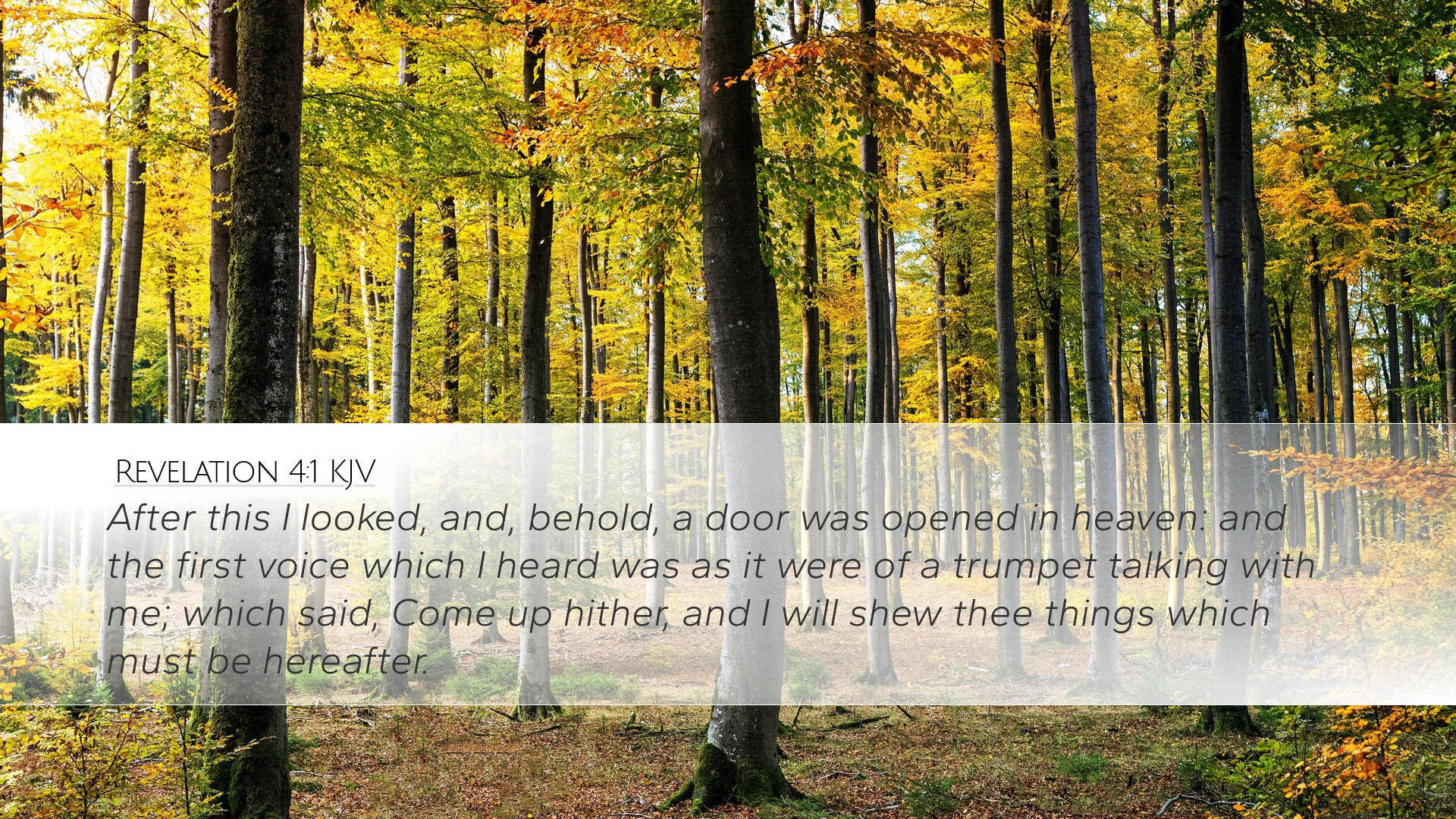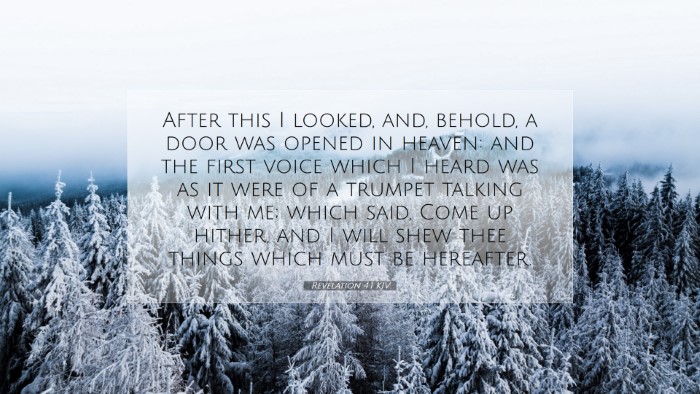Commentary on Revelation 4:1
The verse Revelation 4:1 serves as a significant transitional moment in the Book of Revelation. It invites readers into a deeper understanding of the divine reality beyond human perception. This commentary synthesizes insights from several public domain commentaries to provide a meaningful exploration of the text.
Text of Revelation 4:1
"After this I looked, and behold, a door was opened in heaven: and the first voice which I heard was as it were of a trumpet talking with me; which said, Come up hither, and I will shew thee things which must be hereafter." (KJV)
Contextual Overview
Matthew Henry notes that the preceding chapters primarily focus on the letters to the seven churches and their messages. Chapter 4 begins a new section where John is called to witness the heavenly realities that will unfold. This shift emphasizes the contrast between the earthly struggles of the church and the heavenly sovereignty of God.
Heavenly Revelation
Henry also highlights that the "door opened in heaven" symbolizes divine invitation and access to sacred truths. The door signifies an invitation to witness the heavenly court’s proceedings, showcasing God's majesty and the unfolding of His plan.
Albert Barnes' Perspective
Albert Barnes elaborates on the significance of the voice like a trumpet. This imagery suggests clarity, authority, and urgency. The sound draws attention and conveys the importance of what John is about to witness. Barnes interprets the trumpet as a call to readiness, urging believers to elevate their thoughts from the mundane to the celestial.
Adam Clarke’s Insight
Adam Clarke provides a nuanced interpretation of the phrase “Come up hither.” This phrase can be seen as a symbolic ascent, inviting believers into spiritual communion with God. Clarke emphasizes that this command reflects God's desire for His people to engage with His presence and to receive divine revelations.
Theological Implications
The call to “come up hither” has profound theological implications. It suggests the accessibility of divine knowledge and the importance of seeking God above earthly distractions. It challenges readers to aspire toward spiritual heights, aligning their lives with God's eternal purposes.
The Promise of Revelation
Both Barnes and Henry agree that this passage establishes the idea that revelation is contingent on divine invitation. The subsequent visions are truths that God desires to reveal to His faithful. The promise to show “things which must be hereafter” conveys the assurance of God’s sovereign plan for the future, encouraging believers to trust in His providence.
Symbolism of the Door
Delving deeper into the symbol of the door, Henry comments that the opening signifies God’s communication and the removal of barriers between heaven and earth. This motif of an open door is recurrent throughout Revelation, representing the relationship between God and humanity.
Spiritual Readiness
Furthermore, the directive to “look” emphasizes spiritual vigilance. Clarke points out that spiritual insight requires believers to “see” beyond the physical realm to grasp the fullness of God's revelation. It is a reminder that understanding divine mysteries necessitates an active and engaged spiritual life.
Practical Applications for Believers
-
Intentionality in Spiritual Pursuit: Just as John was called to ascend, believers today are encouraged to seek deeper communion with God. This requires intentional practices of prayer, worship, and study of God’s Word.
-
Awareness of God’s Sovereignty: The visions that follow this invitation underscore God's control over history. Believers are reminded that despite present circumstances, God is orchestrating a grand narrative that culminates in His ultimate victory.
-
The Call for Boldness: The urgent sound of the trumpet serves as a call for boldness in proclaiming the truths of the Gospel. As we prepare for what is to come, we should be unashamed in sharing God’s revelations with others.
Conclusion
In summary, Revelation 4:1 offers a rich tapestry of insights that challenge believers to rise above worldly distractions and engage with divine realities. The commentaries by Matthew Henry, Albert Barnes, and Adam Clarke provide an invitation to understand the significance of God's call and the promise of His revelation.


